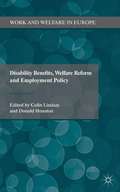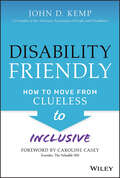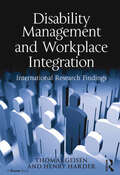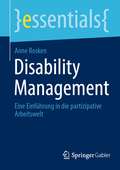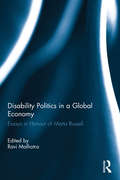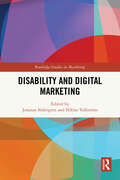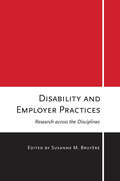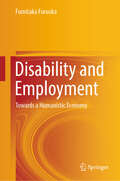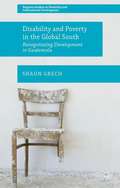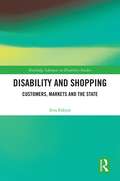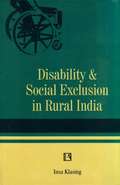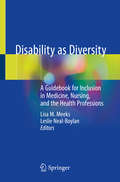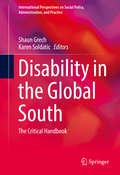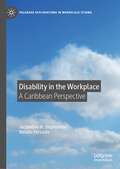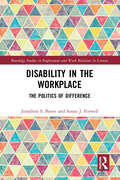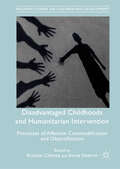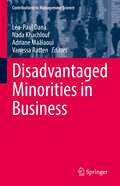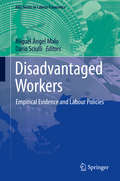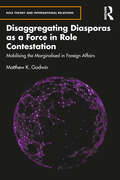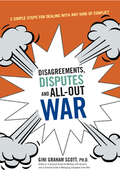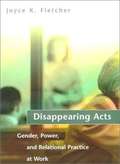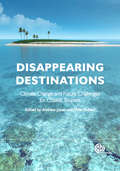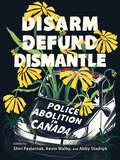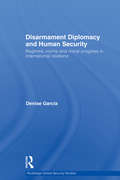- Table View
- List View
Disability Benefits, Welfare Reform and Employment Policy
by Colin Lindsay Donald HoustonThis book aims to tackle the issues that are central to understanding and addressing one of the most important employment policy problems facing governments in the UK and beyond: the high number of people of working age claiming 'disability' or 'incapacity' benefits.
Disability Friendly: How to Move from Clueless to Inclusive
by John D. KempCreate a true culture of inclusion Although progress has been made around equality for many marginalized groups, people with disabilities are still massively underrepresented in organizations&’ Diversity, Equity, and Inclusion efforts. People with disabilities make up at least 15% of the population, yet they are still too often overlooked. Many people with disabilities are highly motivated, create fantastic work, and add tremendous value to organizations. Disability Friendly is a clarion call to businesses around the world to realize the opportunities presented by employing people with disabilities. It explains the potential of disabled employees, how to create a culture of inclusion, and, in the process, help people with disabilities become proud contributors. In this book, you&’ll find: Concrete strategies for redesigning work and its processes to embrace all contributing citizens Ways to incorporate disability supports into a business&’ diversity and inclusion practices and initiatives Methods for reducing the massive cost associated with government disability support payments and repurpose these as investments in the human potential of people with disabilities Ideal for executives, managers, and other business leaders, Disability Friendly will also earn a place in the libraries of Diversity and Inclusion and Human Resources professionals seeking to make an impact on their company and on behalf of a marginalized group.
Disability Management and Workplace Integration: International Research Findings
by Henry G. HarderDisability Management is perceived and understood to be an important approach to reducing the negative impact, for workers and the company, of absence due to illness and accidents, and to assisting those with disabilities to enter or re-enter the workplace. Disability Management has already become established in Canada, Australia, New Zealand, and the USA. Recently European countries have begun to promote the approach in order to reduce illness related expenses and avoid unemployment, early retirement and costs to the welfare state. In Disability Management and Workplace Integration leading researchers from around the World consider the development of Disability Management over the last three decades. They examine the on-going debate about methodology and implementation of disability management strategies and programmes, highlighting the critical debate about the implications of a stricter cost-benefit approach to Disability Management theory and practice. Professionals involved in workplace integration, researchers approaching workplace integration from a variety of perspectives such as sociology; rehabilitative medicine; psychology; education; social policy; and economics, and students on a range of courses, will appreciate this valuable book.
Disability Management: Eine Einführung in die partizipative Arbeitswelt (essentials)
by Anne RoskenDisability Management orientiert sich an den Stärken eines Mitarbeiters. Es setzt sich für eine gleichberechtigte partizipative Eingliederung und Inklusion möglichst vieler Menschen in die Arbeitswelt ein; losgelöst von bekannten Differenzkategorien wie Alter, Beeinträchtigung. Es fußt auf den Grundlagen der UN-Behindertenrechtskonvention. Aufgrund aktueller gesellschaftlicher Entwicklungen ist Disability Management ein neues, sehr relevantes, brisantes und aktuelles Thema im Human Resource Management.Mit einem Gastbeitrag von Donal McAnaney
Disability Politics in a Global Economy: Essays in Honour of Marta Russell
by Ravi MalhotraWhile the visibility of disability studies has increased in recent years, few have thoroughly examined the marginalization of people with disabilities through the lens of political economy. This was the great contribution of Marta Russell (1951-2013), an activist and prominent scholar in the United States and best known for her analyses of the issues faced by people with disabilities. This book examines the legacy of Marta Russell, bringing together distinguished scholars and activists such as Anne Finger, Nirmala Erevelles and Mark Weber, to explicate current issues relevant to the empowerment of people with disabilities. Drawing from various fields including Law, Political Economy, Education and History, the book takes a truly interdisciplinary approach, offering a body of work that develops a dextrous understanding of the marginalization of people with disabilities. The book will be of great use and interest to specialists and students in the fields of Political Economy, Law and Society, Labour Studies, Disability Studies, Women’s Studies, and Political Science.
Disability and Digital Marketing (Routledge Studies in Marketing)
by Jonatan Södergren Niklas VallströmThis book explores how digital marketing can drive disability inclusion in consumer culture by addressing accessibility, representation, and research methodologies. It offers practical and theoretical insights for academics, practitioners, and policymakers interested in marketing, communication, sociology, and public policy.The first part, Digital Marketplace Accessibility, examines strategies for reducing the digital divide, including inclusive hiring practices and accessible platform development. The second part, Digital Representation, focuses on how people with disabilities are portrayed in digital media. It analyses topics such as aesthetics, influencer marketing, mental health advocacy, and neurodiversity. The third part, Digital Methodologies, highlights research approaches like netnography and offers reflections on methodological challenges when researching consumers with disabilities. Contributors discuss practices for conducting ethical and inclusive research involving people with disabilities, providing a roadmap for scholars. The final part, Poetic Epilogue, takes a poetic turn, offering an ecopoetic reflection on lived experiences of Alzheimer’s disease.This book encourages readers to reconsider disability as a complex and intersectional category. It inspires marketers, researchers, and advocates to adopt more inclusive and socially conscious marketing practices, ultimately contributing to a more equitable digital consumer culture.
Disability and Employer Practices: Research across the Disciplines
by Susanne M. BruyèreThis book is about the employment of people with disabilities in the United States and the important role of employer practices. Nearly one in five people report some form of disability, and they are only half as likely to be employed as those without disabilities. With the aging workforce and returning military veterans both contributing to increasing number of disabilities in the workplace, there is an urgent need for better ways to address continuing employment disparities for people with disabilities. Examining employer behaviors is critical to changing this trend. It is essential to understand the factors that motivate employers to engage this workforce and which specific practices are most effective. Disability and Employer Practices features research-based documentation of workplace policies and practices that result in the successful recruitment, retention, advancement, and inclusion of individuals with disabilities. The Cornell team whose work is featured in this book drew from multiple disciplines, data sources, and methodologies to learn where employment disparities for people with disabilities occur and to identify workplace policies and practices that might remediate them. The contributors include individuals with expertise in the fields of business, economics, education, environmental design and analysis, human resources, management, industrial/organizational psychology, public health, rehabilitation psychology, research methods, survey design, educational measurement, statistics, and vocational rehabilitation counseling. Contributors Linda Barrington, Institute for Compensation Studies, ILR School, Cornell University Susanne M. Bruyère, K. Lisa Yang and Hock E. Tan Institute on Employment and Disability, ILR School, Cornell University Hassan Enayati, K. Lisa Yang and Hock E. Tan Institute on Employment and Disability, ILR School, Cornell University William A. Erickson, K. Lisa Yang and Hock E. Tan Institute on Employment and Disability, ILR School, Cornell University Kevin Hallock, Institute for Compensation Studies, ILR School, Cornell University Arun Karpur, K. Lisa Yang and Hock E. Tan Institute on Employment and Disability, ILR School, Cornell University Lisa Nishii, Human Resource Studies, ILR School, Cornell University Ellice Switzer, K. Lisa Yang and Hock E. Tan Institute on Employment and Disability, ILR School, Cornell University Sarah von Schrader, K. Lisa Yang and Hock E. Tan Institute on Employment and Disability, ILR School, Cornell University Sara Van Looy, K. Lisa Yang and Hock E. Tan Institute on Employment and Disability, ILR School, Cornell University
Disability and Employment: Towards a Humanistic Economy
by Fumitaka FuruokaThis book offers new knowledge on the intricate interplay between employment and disability. It provides a timely scholarly deliberation and presents policy solutions to tackle the persistently high unemployment among people with disabilities. This critical issue in the labour market obstructs fostering inclusive economic growth by ensuring employment opportunities for all under Goal 8 of the Sustainable Development Goals. This insightful work dissects how negative stereotypes of people with disabilities in the labour market are perpetuated and highlights knowledge gaps in the available literature on the disability‒employment relationship. It offers a systematic empirical analysis of the patterns of the unemployment rate of people with disabilities and its convergence, and it examines the determinants of the unemployment gap between people with and without disabilities. Theoretical deliberations are presented regarding the effectiveness of labour market interventions designed to solve this issue. By exploring the concept of disability and offering empirical analysis and labour market solutions, this book serves as a valuable resource for policymakers, advocates, and anyone committed to achieving more inclusive economic growth and moving towards a more humanistic economy.
Disability and Poverty in the Global South: Renegotiating Development In Guatemala (Palgrave Studies in Disability and International Development)
by Shaun GrechDisability and Poverty in the Global South
Disability and Shopping: Customers, Markets and the State (Routledge Advances in Disability Studies)
by Ieva EskytėDisability and Shopping:Customers, Markets and the State provides an examination of the diverse experiences and perspectives of disabled customers, industry and civil society. It discusses how the interaction between the three stakeholders should be shaped at aiming to decrease inequality and marginalisation. Shopping is a part of everyday modern life and yet businesses struggle to adequately meet the needs of 80 million disabled customers in the European Union single market. While there has been extensive research into how individuals engage in customer roles and experience, and how businesses and policies both shape and respond to these, little is known of the same dynamics and practices regarding people with impairments. This book addresses this need by revealing the perspectives, interactions and experiences of disabled customers and their interaction with policy and business. It will be required reading for all scholars and students of disability studies, sociology, marketing and customer relations.
Disability and Social Exclusion in Rural India
by Insa KlasingIndia is home to a population of 50 million disabled people, the worlds largest outside China. Although 80 per cent of disabled people in India live in rural areas, the government and NGOs direct their activity almost exclusively towards urban centres, and little research has been conducted in rural communities where the incidence of disability is greatest. This book sheds new light on the marginalisation of disabled people in rural India. It exposes the barriers that exclude disabled people from participation in education, livelihoods, social life and medical care. Comprehensive chapters describe each aspect of exclusion in turn, explaining the barriers to participation and evaluating the governments policy and programmatic response. Each chapter ends with recommendations for government policy and an agenda for NGO intervention. This study finds that social exclusion defines the experience of being disabled in rural India at least as much as disability itself.
Disability as Diversity: A Guidebook for Inclusion in Medicine, Nursing, and the Health Professions
by Leslie Neal-Boylan Lisa M. MeeksAdministrators and faculty in medical, nursing and health science programs are witnessing a substantial increase in the number of students with disabilities entering their programs. Concurrently, the benefits of diversity in healthcare are becoming increasingly apparent and important. Provider-patient concordance is a known mechanism for reducing health care disparities. By developing a workforce that mirrors the patient population, we can appropriately inform disability care, reducing health care disparities while embracing the tenets of the Americans With Disabilities Act (ADA), namely equal opportunity, full participation, independent living, and economic self-sufficiency for qualified individuals with disabilities. One in five individuals will experience disability at some point in their lives, making this the largest minority in the US. A commitment to disability inclusion for qualified students should be a high-level goal of nursing, medical, and other health science programs. To support this goal, leaders in these areas must develop robust programs and an understanding of the best practices for inclusion. This first-of-its-kind title is designed to help deans, program directors, faculty, student affairs personnel and disability resource professionals thoughtfully plan for the growing population of health-care professionals with disabilities. The content helps stakeholders contextualize disability inclusion in health-care education as a function of social justice and a mechanism of reducing health care disparities for patients. It offers pragmatic advice, grounded in research, best practice, and case law to address the highly nuanced approach to determining and implementing accommodations in a high-stakes clinical environment. Disability as Diversity connects the moving parts necessary to ensure equal access for qualified students and provides a blueprint for crafting policy, proactive messaging, improving climate, adhering to accreditation standards, addressing licensing and board exams, responding to student failure, all while remaining compliant with the Americans with Disabilities Act (ADA), and applicable Federal regulations. This text provides educators with the perspectives and skills they need to bring disability inclusion to the forefront of health education.
Disability in the Global South
by Shaun Grech Karen SoldaticThis first-of-its kind volume spans the breadth of disability research and practice specifically focusing on the global South. Established and emerging scholars alongside advocates adopt a critical and interdisciplinary stance to probe, challenge and shift common held social understandings of disability in established discourses, epistemologies and practices, including those in prominent areas such as global health, disability studies and international development. Motivated by decolonizing approaches, contributors carefully weave the lived and embodied experiences of disabled people, families and communities through contextual, cultural, spatial, racial, economic, identity and geopolitical complexities and heterogeneities. Dispatches from Ghana, Lebanon, Sri Lanka, Cambodia, Venezuela among many others spotlight the complex uncertainties of modern geopolitics of coloniality; emergent forms of governance including neoliberal globalization, war and conflicts; the interstices of gender, race, ethnicity, space and religion; structural barriers to redistribution and realization of rights; and processes of disability representation. This handbook examines in rigorous depth, established practices and discourses in disability including those on development, rights, policies and practices, opening a space for critical debate on hegemonic and often unquestioned terrains. Highlights of the coverage include: Critical issues in conceptualizing disability across cultures The challenges of disability statistics. Colonialism and disability Disability and poverty: critical renegotiations Livelihoods and disability: the complexities of labouring in the global South. Intersectional terrains, including migration, race, ethnicity, and customary embodiedness Disability and Religion Violence against disabled women in the global South: working locally, acting globally. Disability-inclusive disaster risk reduction The UNCRPD and critical orientations towards disability rights within various contextual settings Redistribution systems including disability inclusive budgeting, social security regimes and social policy measures Global South-North partnerships: intercultural methodologies in disability research. This much awaited handbook provides students, academics, practitioners and policymakers with an authoritative framework for critical thinking and debate about disability, while pushing theoretical and practical frontiers in unprecedented ways.
Disability in the Workplace: A Caribbean Perspective (Palgrave Explorations in Workplace Stigma)
by Natalie Persadie Jacqueline H. StephensonThis work critically examines diversity, discrimination, and inclusion in the English-speaking Caribbean nations, with a specific emphasis on persons with disabilities. The chapters include an evaluative analysis on the extant theoretical and empirical literature on persons with disabilities in employment, exploring the nature of their disability, the role of information technology in gaining and retaining employment, and an analysis of the laws and relevant policies which prohibit the discrimination against persons with disabilities in the Caribbean region. Though the enactment of legislation outlawing the discrimination of persons with disabilities is not widespread in the Caribbean, a few select territories have taken positive steps towards recognition of the need to achieve inclusion of persons with disabilities and accept the diversity of the Caribbean populace.After exploring the general state of disability and discrimination in the Caribbean region, the authors analyze workplace accommodations provided to persons with disability, particularly as relations to IT and assistive devices, before focusing on workplace stigmas related to mental health disability and employment law.In addition to literature-based analyses, the book includes qualitative case studies, with the goal of providing benchmarks in organizational responses to employees with disabilities. Further, the authors highlight lessons to be learned from other countries in addressing inequality in the workplace for disabled persons.With its analysis of employment as well as socio-economic and legal issues, this interdisciplinary text will serve as a useful resource in not only understanding the organizational challenges faced by persons with disabilities in the region but also the necessary legislation needed to address discriminatory practices on a wider scale.
Disability in the Workplace: The Politics of Difference (Routledge Studies in Employment and Work Relations in Context)
by Jonathon S. Breen Susan J. ForwellThis book introduces the difference model of disability. Framed within an affect-based understanding of the relationships between those living with impairments and others, this new model offers a reconsideration of the construct of disability itself. Disability is flexible, relational, and perceived through an acognitive lens. At a practice level, the difference model offers a framework for creating more positive and successful relationships between people with disabilities (PWDs) and others within the workplace. This includes two new tools, the Co-Worker Acceptance of Disabled Employees (CADE) Scale and the Perceived Barriers to Employing Persons with Disabilities (PBED) Scale. Designed to measure workplace attitudes, and changes to these attitudes, each of these scales provides empirical evidence in support of strategic planning and, ultimately, an increased representation of PWDs. Finally, this book considers the effects of language and technology on workplace attitudes toward disability.
Disadvantaged Childhoods and Humanitarian Intervention: Processes of Affective Commodification and Objectification (Palgrave Studies on Children and Development)
by Kristen Cheney Aviva SinervoThis book explores how humanitarian interventions for children in difficult circumstances engage in affective commodification of disadvantaged childhoods. The chapters consider how transnational charitable industries are created and mobilized around childhood need—highlighting children in situations of war and poverty, and with indeterminate access to health and education—to redirect global resource flows and sentiments in order to address concerns of child suffering. The authors discuss examples from around the world to show how, as much as these processes can help achieve the goals of aid organizations, such practices can also perpetuate the conditions that organizations seek to alleviate and thereby endanger the very children they intend to help.
Disadvantaged Minorities in Business (Contributions to Management Science)
by Léo-Paul Dana Vanessa Ratten Adnane Maâlaoui Nada KhachloufThis book features contributions by international scholars who have worked to establish a theory- and empirics-based discussion on disadvantaged minorities and long-term economic development. Depending on their socio-demographic characteristics, minorities have long lived under the shadow of the groups, categories, or communities they presumably belong to. Despite the obstacles they have to face, they manage to demonstrate that, above all, they are entrepreneurs capable to start, run, and successfully complete their venture. Their motivations are often assimilated by the research community into “necessity entrepreneurship.” In addition to the external barriers they face, they have to overcome endogenous cognitive factors that hinder their entrepreneurial intention: anxiety before the future, the anguish of death, generativity, health condition as perceived by others, subjective age, and the cultural gap as viewed by natives, among others. The book integrates a diversity of challenges and disadvantages faced by entrepreneurs, allowing the reader to have a renewed understanding of entrepreneurial behavior. On the theoretical level, the chapters emphasize the need for integrating entrepreneurship theory with multidisciplinary approaches, such as the Theory of Cumulative Disadvantage/Advantage (CDA), cultural and geographical theories, and psychological theories. On the practical level, this book would raise the awareness of policy makers, mainly governmental and nongovernmental organizations concerning the disadvantages, and helping them adjust their actions either for local or international programs.Chapter "Intersectionality and Minority Entrepreneurship: At the Crossroad of Vulnerability and Power" is available open access under a Creative Commons Attribution 4.0 International License via link.springer.com.
Disadvantaged Workers
by Dario Sciulli Miguel Ángel MaloThis book includes empirical contributions focusing on disadvantaged workers. According to the European Commission's definition, disadvantaged workers include categories of workers with difficulties entering the labour market without assistance and hence, requiring the application of public measures aimed at improving their employment opportunities. In addition to the labour market perspective, this is also relevant in terms of social cohesion, which is one of the central objectives of the European Union and of its Member States. This work deals with the most relevant groups of disadvantaged workers, namely disabled workers, young workers, women living in depressed areas, migrants in the labour market and the long-term unemployed, and analyses the situation in the Italian, Spanish and some African labour markets. The determinants of disadvantage in the labour market are investigated, highlighting both the role of supply variables, including structural factors and the weakness on the demand side, the role of the economic crisis and the ineffectiveness of some labour policies. A complex framework emerges in which disadvantaged groups may share common problems, both in terms of integration into the labour market and in terms of working conditions, but often require group-specific policies, taking into account their intergroup heterogeneity.
Disaggregating Diasporas as a Force in Role Contestation: Mobilising the Marginalised in Foreign Affairs (Role Theory and International Relations)
by Matthew K. GodwinUsing a Role Theory lens, this book investigates Tamil diaspora mass movements and interest groups as marginalised forces of domestic foreign policy influence. Until now Role Theory has not considered diaspora mass movements as collective action actors, nor looked at how marginalised diasporas influence elite foreign policy decision-making. Matthew K. Godwin employs a comparative, micro-level decisionmaking narrative that looks incisively at decisions faced by the British and Canadian governments in 2009 and 2013 towards the Sri Lankan civil war and its aftermath. Through qualitative, elite-level interviews and content analysis of other primary source data, Godwin convincingly argues that when diaspora interest group elites are leveraging the power of mass movements in concert with credible partisan advocates, they can influence role contestation. However, international institutional constraints on role behaviour may stymie their preferred role performance, especially if states are indispensable to the institutions their behaviour may unravel. Ultimately, Godwin concludes that some states can't behave "badly," even when they want to. This book will be of interest to students and researchers oflnternational Relations, Foreign Policy Analysis, Comparative Politics, Migration Studies and to non-government organisations who seek to influence governments.
Disagreements, Disputes, and All-Out War: Three Simple Steps for Dealing with Any Kind of Conflict
by Gini ScottThe potential for conflict exists in every interaction. But when one doesn't know how to deal with these disagreements constructively, they can escalate into unproductive and even destructive situations. The key is not to avoid conflict, but to recognize and manage it skillfully to produce the best possible outcome. In this powerful and practical guide, author Gini Graham Scott shows readers how to identify the reason for the conflict, recognize and control the emotional factors, and find the best solution. Written in an accessible, conversational style, packed with real-life examples, and including simple exercises and tools to help assess conflict situations, this indispensable guide shows readers how to handle whatever life throws at them.
Disappearing Acts: Gender, Power, and Relational Practice at Work
by Joyce K. FletcherChosen as a finalist in the George R. Terry Book Award presented by the Academy of Management for outstanding contribution to the advancement of management knowledge. With its move from hierarchical to team-based structures and its dismantling of functional barriers, the organization of the future is touted as a radical departure from traditional models. The worker of the future, we are told, must be a collaborative team player, able to give and receive help, empower others, and operate in a world of interdependence. This new worker needs relational skills and emotional intelligence--the ability to work effectively with others and understand the emotional context in which work takes place. Paradoxically, the very skills that give organizations a competitive advantage may be precisely those that prevent individual employees--especially women--from advancing. In this book Joyce K. Fletcher presents a study of female design engineers that has profound implications for attempts to change organizational culture. Her research shows that emotional intelligence and relational behavior often "get disappeared" in practice, not because they are ineffective but because they are associated with the feminine or softer side of work. Even when they are in line with stated goals, these behaviors are viewed as inappropriate to the workplace because they collide with powerful, gender-linked images of good workers and successful organizations. Fletcher describes how this collision of gender and power "disappears" the very behavior that organizations say they need and undermines the possibility of radical change. She shows why the "female advantage" does not seem to be advantaging females or organizations. Finally, she suggests ways that individuals and organizations can make visible the invisible work--and people--critical to organizational competence and transformation.
Disappearing Destinations:
by Dr Bas Amelung Dr Giorgio Anfuso Dr Andrew L Jones Dr Michael PhillipsProviding a thorough examination of the threats posed to destinations by tourism, this comprehensive text discusses how popular and fragile destinations such as the Great Barrier Reef could become severely damaged and forced to close to tourists if current tourism trends continue. The consequences of tourism growth, predicted changes, and management and policy responses are reviewed. The book will explore tourism in the context of climate change and vulnerable environments, exploring the situation at local level and in a wider perspective using international case studies throughout and providing future recommendations. It will be an essential text for researchers, policymakers and students in tourism, ecotourism, environmental conservation, planning, coastal management and engineering, climate change and marine conservation.
Disarm, Defund, Dismantle: Police Abolition in Canada
by Kevin Walby Shiri Pasternak Abby StadnykCanadian laws are just, the police uphold the rule of law and treat everyone equally, and without the police, communities would descend into chaos and disorder. These entrenched myths, rooted in settler-colonial logic, work to obscure a hard truth: the police do not keep us safe. This edited collection brings together writing from a range of activists and scholars, whose words are rooted in experience and solidarity with those putting their lives on the line to fight for police abolition in Canada. Together, they imagine a different world—one in which police power is eroded and dissolved forever, one in which it is possible to respond to distress and harm with assistance and care.
Disarmament Diplomacy and Human Security: Regimes, Norms and Moral Progress in International Relations (Routledge Global Security Studies)
by Denise GarciaThis book assesses how progress in disarmament diplomacy in the last decade has improved human security. In doing so, the book looks at three cases of the development of international norms in this arena. First, it traces how new international normative understandings have shaped the evolution of and support for an Arms Trade Treaty (the supply side of the arms trade); and, second, it examines the small arms international regime and examines a multilateral initiative that aims to address the demand side (by the Geneva Declaration); and, third, it examines the evolution of two processes to ban and regulate cluster munitions. The formation of international norms in these areas is a remarkable development, as it means that a domain that was previously thought to be the exclusive purview of states, i.e. how they procure and manage arms, has been penetrated by multiple influences from worldwide civil society. As a result, norms and treaties are being established to address the domain of arms, and states will have more multilateral restriction over their arms and less sovereignty in this domain. This book will be of much interest to students of the arms trade, international security, international law, human security and IR in general. Denise Garcia is Assistant Professor in the Department of Political Science at Northeastern University, Boston. She is author of Small Arms and Security (Routledge 2006).
Disassembling Police Culture (Routledge Frontiers of Criminal Justice)
by Mike RoweDrawing on six years of ethnographic research, this book critically examines police culture, exploring police behaviours, decisionmaking and actions. Police culture is a concept widely used, often critically, to characterise the working attitudes and behaviours of (usually uniformed) police officers. It is shorthand for a workplace imbued with machismo, racism, sexism, a thirst for danger and excitement, cynicism and conservatism. Rather than looking for culture or identifying how culture affects behaviours, this book identifies factors that influence the decisions and actions, including technology, targets, training, timing, intelligence, geography and supervision, thus reassembling police culture much as Bruno Latour sought to reassemble the social. The analysis develops a clearer and critical understanding of culture by explicitly connecting the debates about police culture to those about organisational culture. Offering a detailed ethnography of two shifts, it grounds the analysis of the idea of police culture in a 'thick description' of the day- to- day activities observed in the police station and the patrol car, rather than using brief illustrative extracts. The book dispenses with any assumption of the utility of the concept of police culture, not least because it is opaque, and reassembles our understanding of policing and, if it retains any relevance, of police culture. An accessible and compelling read, this book will appeal to students and scholars of policing, criminology, sociology, law, politics and all those interested in the day- to- day lives of police officers.
